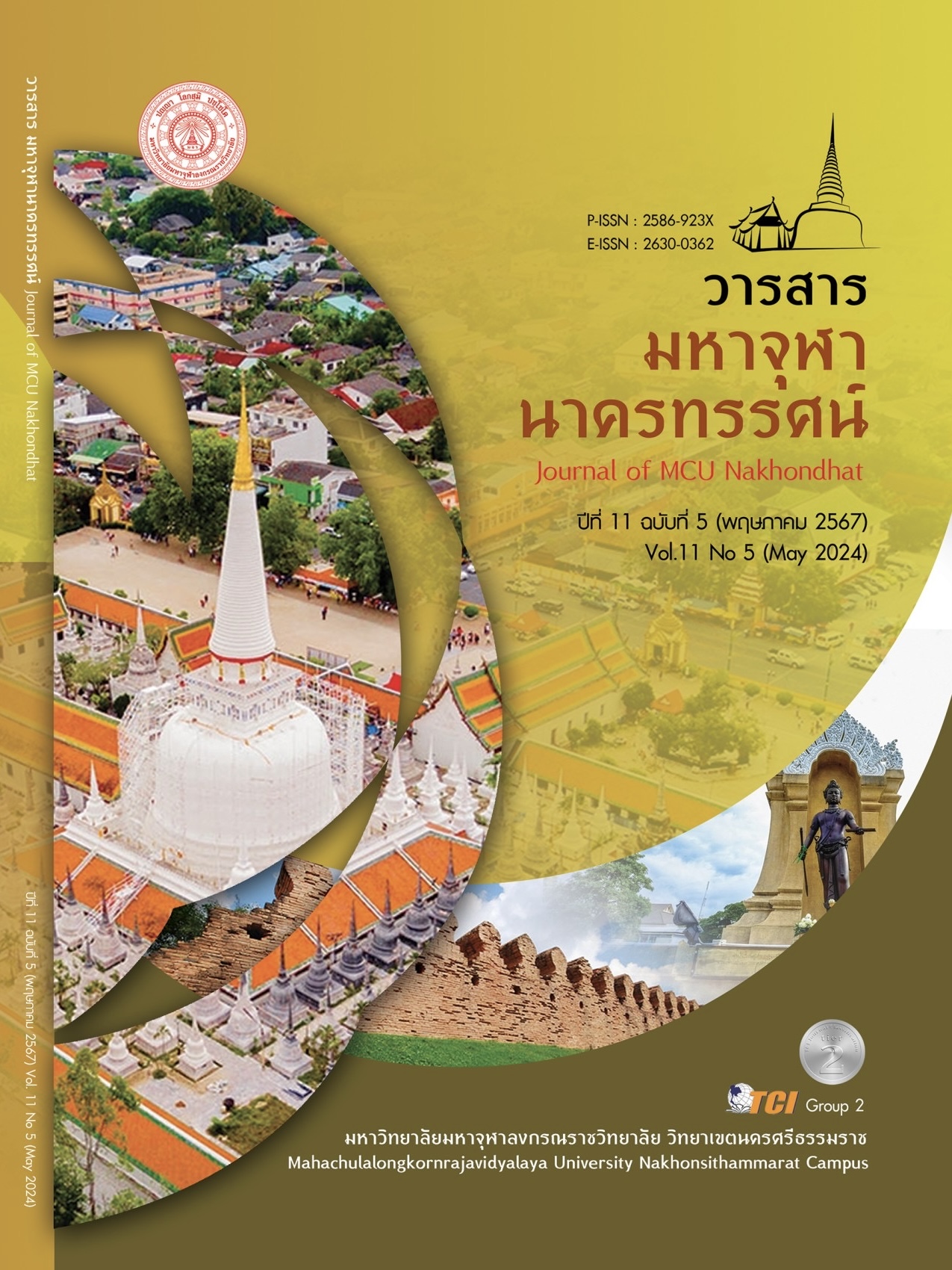DEVELOPMENT OF TOURIST GUIDE POTENTIAL MODEL IN TOURISM INDUSTRIAL BUSINESS OF THAILAND IN THE DIGITAL AGE
Main Article Content
Abstract
The purpose of this research was to 1) study the potential components of tour guides in the tourism industry of Thailand in the digital age. 2) develop a model of the potential of tour guides in the tourism industry of Thailand in the digital age. 3) create a guideline for developing the potential of tour guides in Thailand's tourism industry business in the digital age. This research is a combination of qualitative research and quantitative research. Conduct research using Composition analysis There was an in-depth interview with 5 experts, 5 experts in questionnaire evaluation and a group of experts. 13 people participated in the focus group meeting. The research tools included questionnaires and group discussions. Model evaluation and evaluation manual Perform data analysis with median statistics. Interquartile range analysis and composition analysis the research results found that Components of developing a potential model for tour guides in Thailand's tourism industry in the digital age consist of 12 elements: 1) information communication and coordination, 2) application of digital technology, 3) social responsibility, 4) human relations, 5) ethics. Profession 6) Morality and Ethics 7) Adaptation 8) Tourism Ways 9) Local Culture 10) Management 11) Solving immediate problems 12) Decision Making by taking all 12 elements and regrouping them into 4 dimensions. 4 dimensions consisting of 1) digital technology and communication 2) characteristics of tour guides 3) professional knowledge 4) organizational management by experts Participate in group discussion meetings there was a unanimous resolution that the composition is appropriate. and experts have evaluated and concluded that the guideline for developing the potential model of tour guides in Thailand's tourism industry in the digital age It is appropriate and can be applied.
Article Details

This work is licensed under a Creative Commons Attribution-NonCommercial-NoDerivatives 4.0 International License.
References
กระทรวงการท่องเที่ยวและกีฬา. (2565). รายงานประจำปี 2561. เรียกใช้เมื่อ 15 ธันวาคม 2565 จาก https://www.mots.go.th/download/AnnualReport/AnnualReport2561resize.pdf
กิตต์กวินเดชน์ วงศ์หมั่น. (2564). รูปแบบการพัฒนาศักยภาพมัคคุเทศก์ท้องถิ่นอย่างมีส่วนร่วมของชุมชนท่องเที่ยวเมืองตาก อำเภอเมือง จังหวัดตาก. วารสารมนุษยศาสตร์และสังคมศาสตร์ มหาวิทยาลัยราชพฤกษ์, 7(พิเศษ), 54-70.
กิตติศักดิ์ กลิ่นหมื่นไวย. (2561). การศึกษาศักยภาพและสร้างรูปแบบเส้นทางการท่องเที่ยวชุมชนและมัคคุเทศก์ท้องถิ่นการท่องเที่ยวชุมชนเทศบาล ตำบลนาครัว อำเภอแม่ทะ จังหวัดลำปาง. วารสารมนุษยศาสตร์และสังคมศาสตร์ มหาวิทยาลัยธนบุรี, 12(28), 85-97.
ธนาภรณ์ ตราชู และฉลองศรี พิมลสมพงศ์. (2564). การพัฒนาความสามารถในการปรับตัวของธุรกิจนำเที่ยวไทยเพื่อตอบสนองอุปสงค์การท่องเที่ยวในยุคดิจิทัล. วารสารเทคโนโลยีภาคใต้, 14(1), 14-23.
นันทวัฒน์ พินิจพรม. (2565). การพัฒนาศักยภาพของมัคคุเทศก์ที่ปฏิบัติงานในเขตภาคตะวันออกเฉียงเหนือตอนบนเพื่อการเตรียมเข้าสู่ประชาคมอาเซียน. ใน วิทยานิพนธ์ศิลปศาสตรมหาบัณฑิต สาขาวิชายุทธศาสตร์การพัฒนา. มหาวิทยาลัยราชภัฏอุดรธานี.
ปริญญา ศักดิ์นาวี. (2560). การพัฒนารูปแบบศักยภาพผู้ประกอบการธุรกิจอีเว้นท์เพื่อการแข่งขัน. ใน วิทยานิพนธ์บริหารธุรกิจดุษฎีบัณฑิต สาขาวิชาการพัฒนาธุรกิจอุตสาหกรรมและทรัพยากรมนุษย์. มหาวิทยาลัยเทคโนโลยีพระจอมเกล้าพระนครเหนือ.
วิวัฒน์ จันทร์กิ่งทอง และกอแก้ว จันทร์กิ่งทอง. (2564). รูปแบบการพัฒนาศักยภาพมัคคุเทศก์ท้องถิ่นอย่างมีส่วนร่วมของชุมชนท่องเที่ยว เมืองตาก อำเภอเมือง จังหวัดตาก. วารสารมนุษยศาสตร์และสังคมศาสตร์ มหาวิทยาลัยราชพฤกษ์, 7(พิเศษ), 54-70.
วีระ แก่นเพชร. (2564). แนวทางการพัฒนาการท่องเที่ยวของประเทศไทยเพื่อสร้างมูลค่าเพิ่มในยุคดิจิทัล. วารสารนวัตกรรมและการจัดการ, 6(1), 148-160.
สิทธา อนันธขาล และไพฑูรย์ มนต์พานทอง. (2564). แนวทางการพัฒนาศักยภาพมัคคุเทศก์จังหวัดสตูล. วารสารวิทยาลัยดุสิตธานี, 15(1), 384-400.
สุภาพร สุกสีเหลือง, และคณะ. (2552). แนวทางการพัฒนาศักยภาพ มัคคุเทศก์ทั่วไปอิสระเพื่อส่งเสริมการท่องเที่ยวเชิงนิเวศ ภาควิชาชีววิทยา คณะวิทยาศาสตร์ มหาวิทยาลัยศรีนครินทรวิโรจน์. วารสารศรีนครินทรวิโรฒวิจัยเเละพัฒนา สาขามนุษยศาสตร์เเละสังคมศาสตร์, 1(2), 116-127.
อภิไทย แก้วจรัส. (2554). ศักยภาพมัคคุเทศก์ไทยในศตวรรษที่ 21. วารสารปัญญาภิวัฒน์, 13(3), 283-296.
Bittar Rodrigues, C., & Prideaux, B. (2018). A management model to assist local communities developing community-based tourism ventures: a case study from the Brazilian Amazon. Journal of Ecotourism, 17(1), 1-19.
Kapa, M. G. et al. (2022). An Exploration of Tourist Guides’ Competencies To Create Memorable Tourist Experiences. Geojournal of Tourism and Geosites, 44(4), 1350-1358.
Kiryakova-Dineva, T. et al. (2019). Soft skills for sustainable development in tourism: the Bulgarian experience. European Journal of Sustainable Development, 8(2), 57-67.
Sulaiman Al Jahwari, D. et al. (2016). Evaluating communication competency of tour guides using a modified importance-performance analysis (MIPA). International Journal of Contemporary Hospitality Management, 28(1), 195-218.
Thuyet, N. T. et al. (2022). Necessary Soft Skills for Students Majoring in Tourism Management and Tour Guiding. Tạp chí Khoa học Trường Đại học Mở Hà Nội, 1(2022), 1-8.
Yamane, T. (1967). Statistics : An Introductory Analysis. London: John Weather Hill,Inc.


